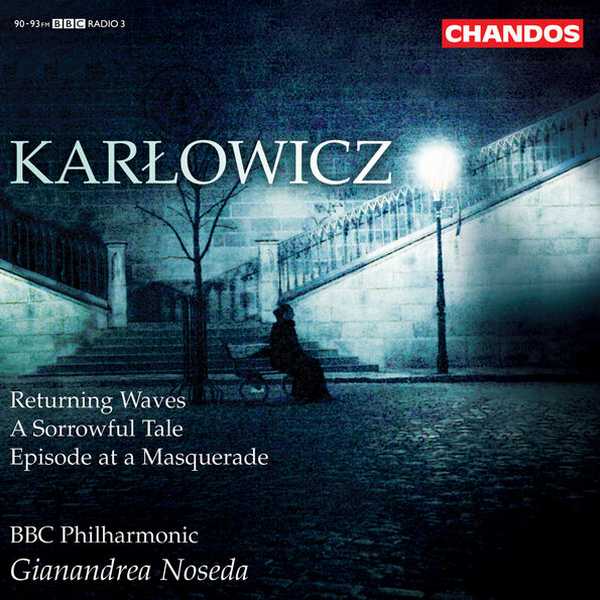

Composer: Mieczysław Karłowicz
Orchestra: BBC Philharmonic Orchestra
Conductor: Gianandrea Noseda
Format: FLAC (tracks)
Label: Chandos
Catalogue: CHAN10298
Release: 2005
Size: 983 MB
Recovery: +3%
Scan: cover
Powracajace fale (Returning Waves), Op. 9
01. I. Andante
02. II. Andante
03. III. Andante assai
04. IV. Andantino
05. V. Andante
06. Smutna opowiesc, (A Sorrowful Tale), Op. 13, “Preludia do wiecznosci” (“Preludes to Eternity”)
Episode at a Masquerade, Op. 14
07. I. Allegro maestoso – Molto agitato
08. II. Molto lento
09. III. Andante
10. IV. Allegro maestoso – Molto agitato
11. V. Molto lento
The period of 1880-1920 is littered with forgotten composers who did not respond to the clarion call of incipient modernism, a trend many in hindsight view as historically inevitable. However, if one could travel back to 1910, one would learn that very idea the decade 1900-1910 would be best remembered by works such as Debussy’s La Mer, Scriabin’s The Poem of Ecstasy, Richard Strauss’ Salome, and Stravinsky’s L’Oiseau de feu would have been viewed as tantamount to the lunatics taking over the asylum. Back then, all of these works represented a controversial extreme in the music of that day. Polish composer Mieczyslaw Karlowicz more represents the norm of that time, a composer whose work reflects the influence of early Strauss, above all others, but utilizes an orchestral palette that is reminiscent of what Erich Wolfgang Korngold would produce in maturity. Karlowicz would never enjoy maturity himself, as he died in a skiing accident at the age of 32 that some speculate may have been a deliberate act.
Karlowicz’s six tone poems, composed between 1904 and 1909, make up the center of his orchestral output, and Chandos’ Karlowicz: Orchestral Works, Vol. 3, explores three of them: Returning Waves, Op. 9, A Sorrowful Tale, Op. 13, and Episode at a Masquerade, Op. 14, in stable, very well-rehearsed interpretations by the BBC Philharmonic under the young Italian conductor Gianandrea Noseda. These recordings do not seem exceptionally inspired in terms of interpretation, but they succeed in delivering Karlowicz’ goods. Returning Waves, Op. 9, is the earliest and the weakest of the three pieces, and there is a recurrent figure reminiscent of the motive in Strauss’ Till Eulenspiegel’s Lüstige Streiche that pops in and out through the whole piece, wearing out its welcome quickly even as the music has more places left to go. Episode at a Masquerade, Op. 14, is like a better version of Returning Waves — although the offending figure is still there, it is less prominent and the music has a chance to open up more to other vistas. The best piece is the shortest, A Sorrowful Tale, Op. 13, a dark, moody, and well orchestrated paean to terminal depression, said to have been inspired by the composer’s own battle against thoughts of suicide. If his demise shortly thereafter was indeed the result of a deliberate accident, then Karlowicz’s battle was a losing one indeed, and certainly there is no resolution of the conflict found in the work.
Karlowicz’s music is interesting, very well crafted orchestrally, and emotional. Moreover, he does not seem quite in the same class as the composers mentioned in the first paragraph of the review, nor even in the class of Rudi Stephan, another orchestral composer of this era whom Chandos has recorded. Nevertheless, one is glad to hear this music, and this time Chandos has made a recording that is not too quiet or variable in volume to hinder the enjoyment.
With this third disc the BBC Philharmonic complete a fine survey of Karpowicz’s orchestral music. Now we can finally enjoy this music in all its rich, velvet-draped luxury.
This instalment is, admittedly, something of a mopping-up exercise, the best of Karpowicz’s output being found on the first of the BBC Philharmonic’s discs (see above). The Nietzschean pessimism of Returning Waves and A Sorrowful Tale relates strongly to the Richard Strauss of Tod und Verklärung pretensions, albeit without the transfiguration.
Here the music sounds as though it has overdosed on Wagner and turned to César Franck for the antidote, compounding rather than solving its problems in finding an individual voice.
In Episode at a Masquerade – completed by Grzegorz Fitelberg following the composer’s tragically early death in a skiing accident – there are attractive, though passing and presumably coincidental, affinities with the Elgar of Cockaigne.
Here, too, the overall atmosphere is far removed from the frivolity that the title (and indeed the opening pages of the score) might suggest.
The BBC Philharmonic’s dynamic principal conductor, Gianandrea Noseda, took the reins from Yan Pascal Tortelier after their first Karpowicz disc. He has a sure instinct for the music’s indulgent textures and melodramatic effusiveness, and orchestral playing and recording are both of the highest class. Self-recommending, then, to explorers of late-Romantic byways.



